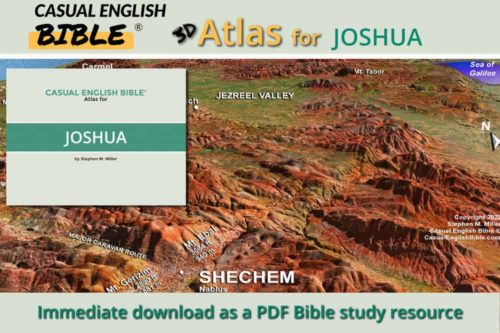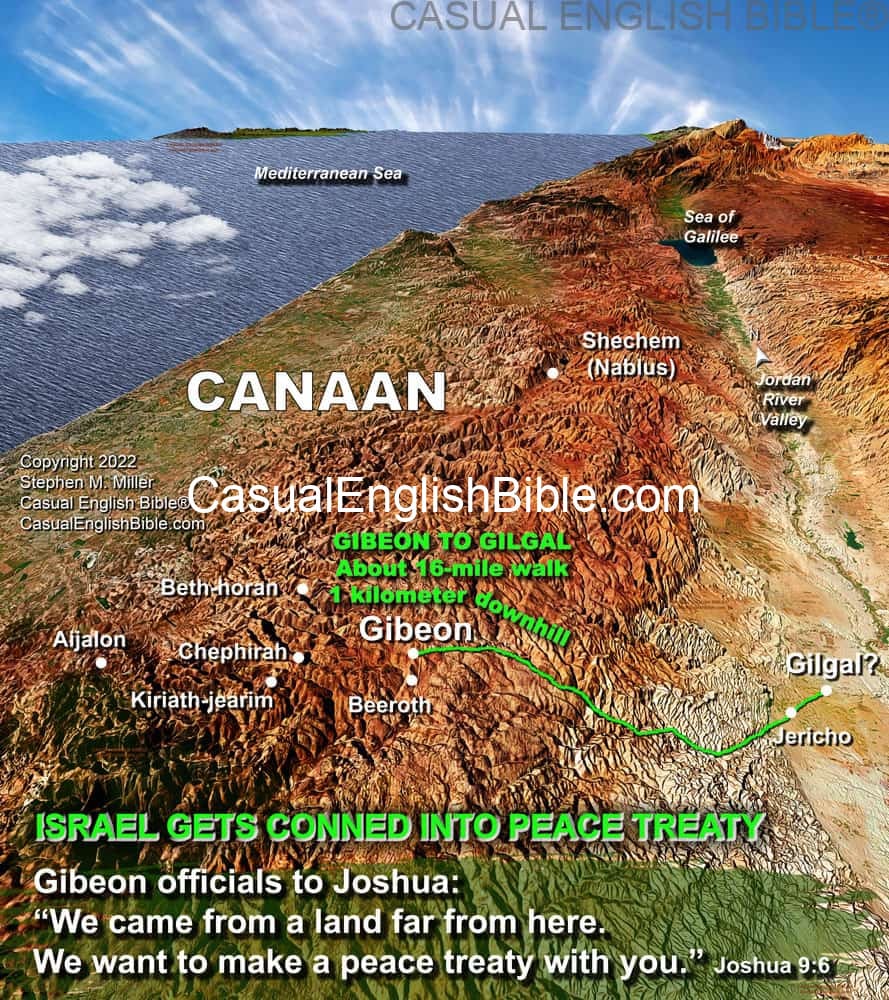Joshua 9
Israel gets conned
Gibeon preps to trick Israel
1Word of Israel’s battlefield victories spread everywhere west of the Jordan River—from the hills and fields to the coastland along the Mediterranean Sea and up toward Lebanon. Worried kingdoms included the Hittites, Amorites, Canaanites, Perizzites, Hivites, and Jebusites. 2Kings of these people throughout the region met to build a coalition army to stop Joshua and his Israelite fighters.3Leaders in the city of Gibeon [1] had heard about Joshua, too. They heard what he did to Jericho and Ai. 4But they took a different approach, one that was cunningly deceptive. They put together provisions, to make it look like they had just finished a long trip. They packed their supplies into worn-out sacks and loaded them onto their donkeys. They also took worn and split-open wineskins resealed with patches. 5They wore threadbare clothes and old sandals, weathered and patched. They packed old bread, dried and crumbling.
Selling the con
6With this disguise, they paid a visit to Joshua in Israel’s camp at Gilgal, near Jericho. They said, “We came from a land far from here. We want to make a peace treaty with you.” 7The men were Hivites. [2] Israelites said, “How do we know you’re telling the truth. You might live near us. And if you do, how can we possibly make a treaty with you?” [3]8They told Joshua, “We’re willing to accept your authority over us and to do as you ask.” Joshua said, “We need to know who you are and where you come from.” 9They said, “We have come a long way because news of the LORD your God has reached all the way to our land. We heard what he did in Egypt. 10And we heard what he did to those two Amorite kings on the opposite side of the Jordan River—King Sihon of Heshbon and King Og of Bashan of Ashtaroth. [4] 11So our leaders and our citizens sent us here. They said, ‘Take whatever supplies you need for the trip. Tell them we’ll accept their authority over us and ask them to make a peace treaty with us.’ 12Look at our bread. When we left our homes, this bread was still hot from the oven. Now it’s dry and crumbling in our hands. 13Look at our wineskins. They were new when we left. They’ve cracked and split open. And we’ve worn out our clothes and sandals on this long trip.”
Israel agrees to peace with Gibeon
14Israelites examined their supplies and bought their story. They didn’t bother to consult the LORD.15Joshua made a peace treaty with them. He agreed to let them live. Israel’s leaders agreed to the deal, which became a binding contract. 16Three days later, Israelites found out they had been conned, and that these men were from nearby, not far away. 17Israelites decided to pay a visit to the people who sent these representatives. Several cities were part of the deal: Gibeon, Chephirah, Beeroth, and Kiriath-jearim. [5]
18Israel didn’t attack them. They couldn’t because Israel’s leaders were bound by promises they made in the peace treaty. Israel’s people criticized the leaders for their bad judgment. 19The leaders said, “When we made that promise to those people, we invoked the name of the LORD, the God of Israel. So, we can’t kill them. 20We need to keep our promise and let them live so God doesn’t hold us accountable for breaking our agreement.”
Gibeon gets job of hauling wood, water
21Israel’s leaders agreed: “We’ll let them live.” But Israel put them to work gathering firewood and hauling water for them. [6] 22Joshua called them on their deception. “Why did you lie to us? You told us you lived far away. Come on, you live just up the path. 23Well, let me tell you something. You’re going to be living with a curse. [7] May you and your descendants always work as our servants, carrying wood and water for the worship center [8] of my God.24Gibeon’s leaders defended their actions: “Our alternative was to let you kill us. The LORD your God clearly told Moses you were getting all this land as God’s gift. He also said you needed to kill all of us. That terrified us. So, we did what we did. 25And here we are, at your mercy. Do to us whatever you think best.” 26Joshua refused to kill them. 27But he did give them the job of hauling wood and water for the worship center, which needed a lot of both for the rituals Israelites performed at the LORD’s sacrificial altar. And he said they would do this wherever the LORD wanted to place the worship center in the future. [9] They’re still doing that job today.
Footnotes
Gibeon has been identified with a dirt mount of ruins called Tel el-Jib less than a day’s walk west of Jericho. It’s on hills overlooking the Jordan River Valley, about 16 miles (25 km) away and one kilometer higher (over half a mile) than their camp in the Jericho plains. Gibeon elevation: 2,425 feet, 739 meters. Elevation of Jericho: -846 feet, -258 m.
Some scholars say these people, if they existed apart from the Hittites, migrated from the same region as the Hittites: Asia Minor, now Turkey. The name of this group of people hasn’t shown up outside the Bible. Some ancient copies of the Bible say the Horites lived in the cities listed in 9:17, not the Hivites. And in 11:3, which places the bulk of the Hivites further north, by Mount Hermon, some ancient copies of the Bible say it was the Hittites who lived there. So, some scholars conclude that someone copying these stories in ancient times had a spelling problem.
The law of Moses demanded Israelites kill them all. “When the LORD your God gives them to you, you’ll need to finish them off. After you defeat them in battle, wipe them out by killing them all. Don’t make any peace treaty with them. Don’t show them mercy” (Deuteronomy 7:2). Also: “They promised the LORD, ‘If you will let us defeat those people, we will annihilate all Canaanites and decimate their cities” (Numbers 21:2). The Hebrew word for “annihilate” is herem. Scholars describe it as a “curse of war” or a “ban.” The “ban” means that when soldiers conquer a city, for example, they are banned from keeping anything for themselves—everything in the city is under the curse of war and must die. Joshua fought by those rules.
Numbers 21:21-26.
Hivites apparently lived in all these neighboring cities or settlements. Chephirah, Beeroth, and Kiriath-jearim were communities west of Gibeon, and perhaps part of Gibeon’s territory.
This is a bit reminiscent of Israel’s slavery in Egypt, but in reverse.
A curse is the opposite of a blessing. Instead of wishing good fortune on people, it’s a wish and a prayer for bad things to happen to them. It’s intended to hurt people. It asks God to show no kindness to them. Many people seemed to believe that the words, with God’s help, had the power to make the wish come true.
Israel’s portable temple, a tent facility also known as the Tabernacle. It took a lot of wood and water to sacrifice animals. Wood to burn them and water to clean up the blood and all the mess that came with it.
King Solomon, David’s son, built Israel’s first permanent worship center: the Jerusalem Temple. Jerusalem was about six miles (10 km) south of where most scholars say Gibeon was located at a mound of ruins called Tel el-Jib.
Discussion Questions
- Sorry, there are currently no questions for this chapter.






